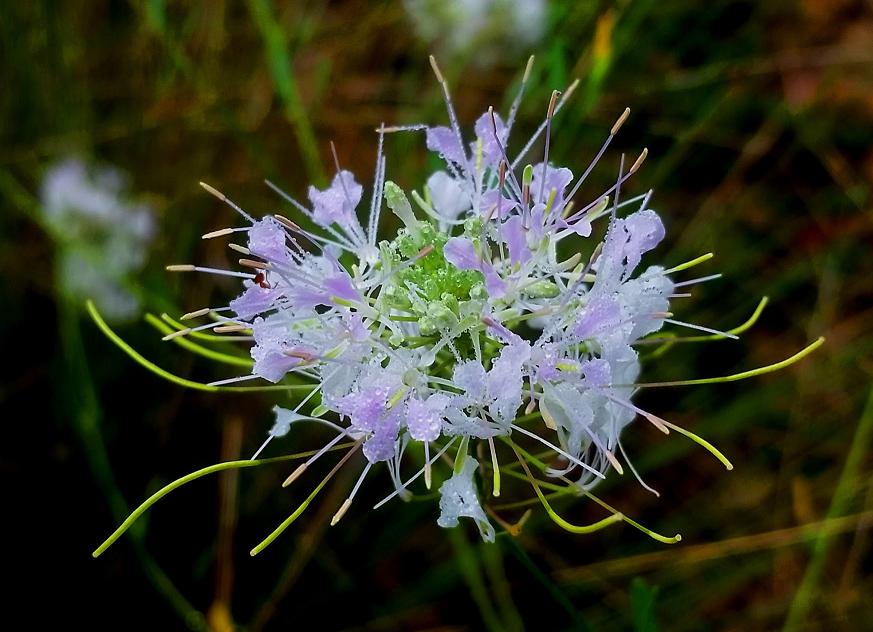Difference between revisions of "Warea cuneifolia"
HaleighJoM (talk | contribs) (→Ecology) |
|||
| (11 intermediate revisions by 5 users not shown) | |||
| Line 1: | Line 1: | ||
| − | |||
| − | |||
{{italic title}} | {{italic title}} | ||
<!-- Get the taxonomy information from the NRCS Plants database --> | <!-- Get the taxonomy information from the NRCS Plants database --> | ||
{{taxobox | {{taxobox | ||
| name = Warea cuneifolia | | name = Warea cuneifolia | ||
| − | | image = | + | | image = Warea cunefolia MMS 2015.jpg |
| − | | image_caption = | + | | image_caption = Photo taken by Michelle Smith |
| regnum = Plantae | | regnum = Plantae | ||
| divisio = Magnoliophyta - Flowering plants | | divisio = Magnoliophyta - Flowering plants | ||
| Line 19: | Line 17: | ||
| range_map_caption = Natural range of ''Warea cuneifolia'' from USDA NRCS [http://www.plants.usda.gov Plants Database]. | | range_map_caption = Natural range of ''Warea cuneifolia'' from USDA NRCS [http://www.plants.usda.gov Plants Database]. | ||
}} | }} | ||
| + | Common names: Carolina pineland-cress, Carolina warea | ||
| + | ==Taxonomic notes== | ||
==Description== | ==Description== | ||
<!-- Basic life history facts such as annual/perrenial, monoecious/dioecious, root morphology, seed type, etc. --> | <!-- Basic life history facts such as annual/perrenial, monoecious/dioecious, root morphology, seed type, etc. --> | ||
| + | A description of ''Warea cuneifolia'' is provided in [http://efloras.org/florataxon.aspx?flora_id=1&taxon_id=250094947 The Flora of North America]. | ||
==Distribution== | ==Distribution== | ||
==Ecology== | ==Ecology== | ||
===Habitat=== <!--Natural Community, human disturbed habitats, topography, hydrology, soils, light, fire regime requirements for removal of competition, etc.--> | ===Habitat=== <!--Natural Community, human disturbed habitats, topography, hydrology, soils, light, fire regime requirements for removal of competition, etc.--> | ||
| + | ''W. cuneifolia'' has been found in sandhills, turkey oak-pine woods, open scrub oak, longleaf pine-scrub oak sand ridges, and longleaf pine woods.<ref name="FSU"> Florida State University Herbarium Database. URL: http://herbarium.bio.fsu.edu. Last accessed: June 2021. Collectors: Loran C. Anderson, R. A. Davidson, R.K. Godfrey, R. F. Thorne, and D. B. Ward. States and counties: Florida: Gadsden, Jackson, and Liberty.</ref> It is also found in disturbed areas including secondary slash pine forests and along fences.<ref name="FSU"/> Associated species: ''Liatris, Polansia, Q. laevis, Q. margaretta, Vaccinium stamineum,'' and ''Trichostema''.<ref name="FSU"/> | ||
| + | <!--===Phenology===--> <!--Timing off flowering, fruiting, seed dispersal, and environmental triggers. Cite PanFlora website if appropriate: http://www.gilnelson.com/PanFlora/ --> | ||
| + | <!--===Seed dispersal===--> | ||
| + | <!--===Seed bank and germination===--> | ||
| + | <!--===Fire ecology===--> <!--Fire tolerance, fire dependence, adaptive fire responses--> | ||
| + | <!--===Pollination===--> | ||
| + | <!--===Herbivory and toxicology=== <!--Common herbivores, granivory, insect hosting, poisonous chemicals, allelopathy, etc.--> | ||
| + | <!--===Diseases and parasites===--> | ||
| + | |||
| + | ==Conservation, cultivation, and restoration== | ||
| − | == | + | ==Cultural use== |
| − | |||
| − | |||
| − | |||
| − | |||
| − | |||
| − | |||
| − | |||
| − | |||
==Photo Gallery== | ==Photo Gallery== | ||
<gallery widths=180px> | <gallery widths=180px> | ||
</gallery> | </gallery> | ||
==References and notes== | ==References and notes== | ||
Latest revision as of 17:30, 18 July 2022
Common names: Carolina pineland-cress, Carolina warea
Contents
Taxonomic notes
Description
A description of Warea cuneifolia is provided in The Flora of North America.
Distribution
Ecology
Habitat
W. cuneifolia has been found in sandhills, turkey oak-pine woods, open scrub oak, longleaf pine-scrub oak sand ridges, and longleaf pine woods.[1] It is also found in disturbed areas including secondary slash pine forests and along fences.[1] Associated species: Liatris, Polansia, Q. laevis, Q. margaretta, Vaccinium stamineum, and Trichostema.[1]
Conservation, cultivation, and restoration
Cultural use
Photo Gallery
References and notes
- ↑ 1.0 1.1 1.2 Florida State University Herbarium Database. URL: http://herbarium.bio.fsu.edu. Last accessed: June 2021. Collectors: Loran C. Anderson, R. A. Davidson, R.K. Godfrey, R. F. Thorne, and D. B. Ward. States and counties: Florida: Gadsden, Jackson, and Liberty.
